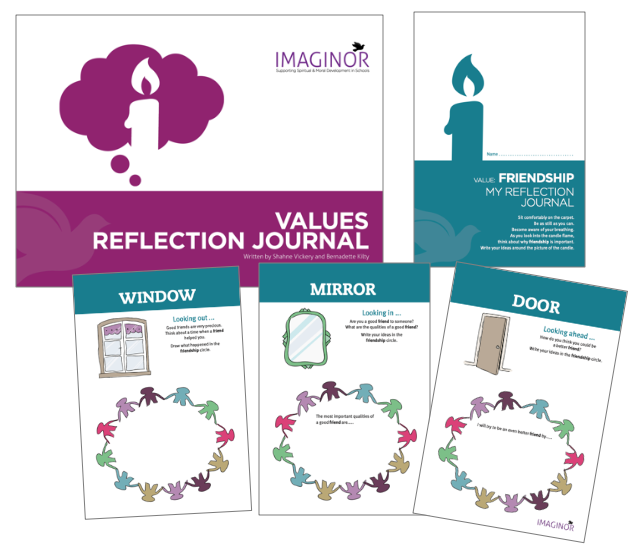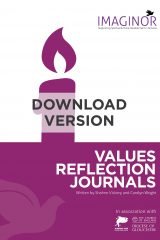
Values Reflection Journal: a framework designed to support children’s spiritual and moral development
as they learn about core Christian values.
Using the popular ‘Windows, Mirrors, Doors’ strategy designed by Liz Mills* to broaden and deepen understanding about spiritual learning, each chapter of the Journal will encourage children to think about inspirational experiences, challenge them to ask searching questions and prompt them to consider some possible opportunities for response. The Journal will also provide teachers with a valuable tool to monitor and evaluate the impact of teaching about values in class and in the whole school community.
Example – Friendship (see graphics above)
The Candle is lit at the start of the journey, as children are asked to think about the qualities of a good friend.
The Window is used as the symbol for an ‘OW’ or ‘WOW’ moment, and children are invited to recall a time when someone showed real kindness and friendship toward them.
The Mirror symbol encourages children to reflect upon how their learning about Friendship may have challenged or changed them.
Finally, the Door prompts children to consider what they might do as a practical response to their journey.
For each value, a single photocopiable sheet folds into an A5 booklet, which can then be included in a journal folder.
All the values explored in Roots & Fruits and Roots & Fruits 2 – Community, Compassion, Courage, Dignity, Forgiveness, Friendship, Generosity, Hope, Joy, Justice, Peace, Perseverance, Respect, Service, Thankfulness, Trust, Truthfulness and Wisdom – are supported in the Reflection Journals.
For schools looking for ‘evidence’ for spiritual development, the Values Reflection Journal will provide a useful record of children’s thinking as they consider these core values and apply them to their lives.
Whilst the Values Reflection Journal does not include any overtly Christian material such as prayers, many teachers have used it as part of class assemblies or reflection time.
* Liz Mills Farmington Millennium Research 1997


